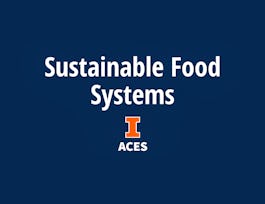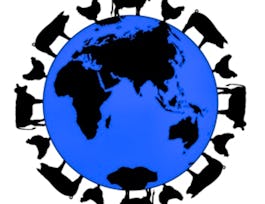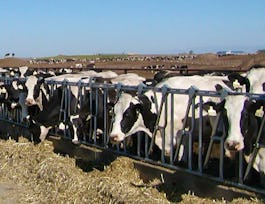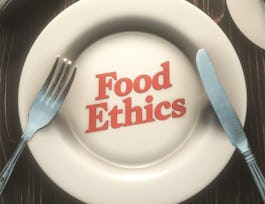Learn about the impact of infectious disease on sustainable animal-based food production by understanding the science of growth, immunity, and infection and by learning the problem-solving skills needed to advance animal health and food production through optimal management practices.



Sustainable Food Production Through Livestock Health Management


Instructors: Dr. Jim Lowe, DVM, MS, Dip ABVP (Food Animal)
32,422 already enrolled
Included with 
(593 reviews)
Skills you'll gain
Details to know

Add to your LinkedIn profile
7 assignments
See how employees at top companies are mastering in-demand skills


Earn a career certificate
Add this credential to your LinkedIn profile, resume, or CV
Share it on social media and in your performance review

There are 7 modules in this course
You will become familiar with the course, your classmates, and our learning environment. The orientation will also help you obtain the technical skills required for the course.
What's included
1 video4 readings1 assignment1 discussion prompt1 plugin
This week we will review the universal and historical principles underlying livestock system design, and how management of genetics, nutrition, and the environment have advanced efficiency through their impact on the physiological processes that control animal growth, development, and production
What's included
7 videos2 readings1 assignment1 discussion prompt
This week we will demonstrate the link between nutrition and health at every stage of life and production by examining the science behind efficient nutritional intake, uptake, and utilization, and exploring the mechanisms by which disease can interfere with these processes.
What's included
7 videos2 readings1 assignment1 peer review1 discussion prompt
This week we will introduce the concept of the farm and each production system as an ecosystem in which animals and microbes live in mutualistic relationships, and explain the beneficial impact of ecologically managing the microbes alongside the animals to enhance host defense, animal health, and production efficiency.
What's included
11 videos2 readings1 assignment1 peer review1 discussion prompt
This week we consider the ravages of infectious disease on animal well-being and production system efficiency by considering disease as a war between infectious agents and their reluctant hosts, acting both at an individual and population level that can be measured and managed.
What's included
6 videos2 readings1 assignment1 peer review1 discussion prompt
This week we will be discussing the role of caregivers in managing, preventing, and controlling infectious disease in livestock-based production systems, and help you appreciate how an understanding of the prey-predator relationship can be used in the design of management strategies to offset physical, physiological, and psychological stress.
What's included
8 videos2 readings1 assignment1 peer review1 discussion prompt
This week we will be discussing infectious disease and its impact on food safety and security at the regional, national, international, and global level. We will also help you understand how outbreaks of important infectious diseases, such as Ebola and foot-and-mouth disease, are tracked and investigated.
What's included
8 videos2 readings1 assignment1 discussion prompt1 plugin
Instructors


Offered by
Recommended if you're interested in Animal Health

University of Illinois Urbana-Champaign

University of Pennsylvania

The Pennsylvania State University

Princeton University
Why people choose Coursera for their career




Learner reviews
593 reviews
- 5 stars
85.52%
- 4 stars
11.95%
- 3 stars
1.51%
- 2 stars
0.33%
- 1 star
0.67%
Showing 3 of 593
Reviewed on Apr 27, 2023
I learned a great deal from this course, the instructors are excellent. This a great course for anyone who wants to learn about sustainable food production.
Reviewed on Sep 27, 2022
This course is very informative, I got to learn new things and I have more insights on the basic ones I know prior to enrolling for this course. Thank you to all the Instructors, God bless.
Reviewed on Jul 29, 2021
This was a well thought out and interesting course that provided me with a good general understanding of sustainable food production through livestock health management
New to Animal Health? Start here.

Open new doors with Coursera Plus
Unlimited access to 10,000+ world-class courses, hands-on projects, and job-ready certificate programs - all included in your subscription
Advance your career with an online degree
Earn a degree from world-class universities - 100% online
Join over 3,400 global companies that choose Coursera for Business
Upskill your employees to excel in the digital economy
Frequently asked questions
Access to lectures and assignments depends on your type of enrollment. If you take a course in audit mode, you will be able to see most course materials for free. To access graded assignments and to earn a Certificate, you will need to purchase the Certificate experience, during or after your audit. If you don't see the audit option:
The course may not offer an audit option. You can try a Free Trial instead, or apply for Financial Aid.
The course may offer 'Full Course, No Certificate' instead. This option lets you see all course materials, submit required assessments, and get a final grade. This also means that you will not be able to purchase a Certificate experience.
When you purchase a Certificate you get access to all course materials, including graded assignments. Upon completing the course, your electronic Certificate will be added to your Accomplishments page - from there, you can print your Certificate or add it to your LinkedIn profile. If you only want to read and view the course content, you can audit the course for free.
You will be eligible for a full refund until two weeks after your payment date, or (for courses that have just launched) until two weeks after the first session of the course begins, whichever is later. You cannot receive a refund once you’ve earned a Course Certificate, even if you complete the course within the two-week refund period. See our full refund policy.

